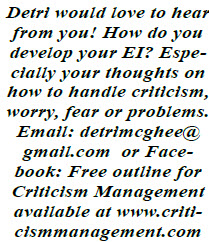 By: Detri L McGhee, CLU, ChFC, B.Min
By: Detri L McGhee, CLU, ChFC, B.Min
This column has approached a number of topics in its days, but for the foreseeable future, we are going to focus on my chosen focus topic, CRITICISM MANAGEMENT. Criticism Management is the skillset that will allow you to gain every bit of profit, wisdom, and help from any and all criticism you will ever receive, from any source possible, AND develop comfortable, workable emotionally sound skills to keep criticism from destroying, hurting, harming, incapacitating, and stealing your energy. You can learn how to dispose of the negative and embrace the positive. Properly applied, you will never look at criticism the same way again.
Before we can turn our focus on Criticism Management, we must look at the over-arching area of Emotional Intelligence. Criticism Management deals with the majority of areas within EI, therefore, we need to get a firm understanding of the EI big picture.
Let’s take it from a reporter’s viewpoint — Who, What, When, Where, How, and Why:
Who needs EI? Everyone. EI should be taught from toddler age through assisted living.
 What is EI? Emotional Intelligence is the ability to wisely handle your own emotions, understanding how to interact effectively with others, whether that be family, friends, coworkers, acquaintances or even strangers. EI is the ability to recognize, understand, and properly display your own emotions as well as being able to do the same with others. Profits of maturity within your own EI include stress relief, effective communications skills, overcoming challenges, controlling conflict, and learning to empathize, not just sympathize, with others.
What is EI? Emotional Intelligence is the ability to wisely handle your own emotions, understanding how to interact effectively with others, whether that be family, friends, coworkers, acquaintances or even strangers. EI is the ability to recognize, understand, and properly display your own emotions as well as being able to do the same with others. Profits of maturity within your own EI include stress relief, effective communications skills, overcoming challenges, controlling conflict, and learning to empathize, not just sympathize, with others.
When is EI important? Always. In every relationship, especially in your relationship with yourself.
Where is EI important? Everywhere. Of course, sometimes it is not as readily identified as required, or even helpful. Yet there is not a facet of life that solid, mature EI cannot make better.
How does EI affect our lives? Strong EI skills develop our natural temperamental strengths, and teach us to overcome our natural weaknesses, as well as open doors of understanding for things we never even dreamed possible. EI enables us to solve problems before they arise. EI shows us how to anticipate problems and develop a solution to them before they even surface. EI brings us levels of joy, effectiveness, understanding, and power that are unavailable to us otherwise.
Why pursue EI? For those lacking strong EI skills, misunderstandings, relationships, and communications pose problems in daily life within every scenario. Personalities that lack mature EI skills tend to make every situation worse, rather than better. They seem to choose the wrong response most often.
Case Study: An upcoming retirement meant that the position she had worked toward for years was now going to be available. She was definitely the most qualified. Educated. Knowledgeable. Trained in every facet of the job. It was inconceivable that anyone else would be seriously considered. Everyone knew this. She could hardly contain her excitement when the day to announce the promotion arrived. Imagine her deep disappointment when a less-qualified employee was selected. Devastated. Crushed. Furious! Her manager was not surprised when she boldly asked to speak with him and practically demanded to know why she was passed over. Was it because they wanted a man? Was this person a relative of the owner? WHY? She was taken aback when the real reason was explained. “I’m sorry, but your relationship with your coworkers is not conducive to you being their leader. Your job is exemplary; your work is excellent… but you do not seem to relate to or understand them. You cannot take suggestions well, and when others make suggestions, you appear to be offended or just brush them off. We value you in the position you are in, but do not think you are ready for management.”
Unfortunately, because of her lack of EI maturity, she left angry, bitter and thinking she might resign. She blamed it on their prejudice because she was a woman. She thought of reasons the lost promotion was because of the actions or desires of others. And she vowed to do as little as possible to help that other person succeed. In her mind, the boss was simply covering up the real reason.
Upon arriving home, she shared with all who would listen about her mistreatment. She continued her bitter attitude allowing it to infect other relationships. She became more difficult to be around for family, friends, coworkers, and strangers.
Thankfully for her, EI training had become the new Hot Topic among wise management teams. And, after taking her company’s EI courses, she grew more mature in her thoughts, actions, and relationships. In learning the value of ACTING instead of REACTING, this employee learned to truly listen to her fellow employees and even her supervisors. She began actively learning from them, developing her skills at work, but even more important, she gained control over other areas of her life. Seldom was she wasting time being upset, imagining how she was wronged, or planning how to pay back those who criticized or differed with her. Although it took a few more years for an appropriate advancement to become available, it was almost immediately that she began enjoying her job, her coworkers, and even her family in new and exciting ways.
Wouldn’t this have been a much happier story if she had been schooled on EI skills years earlier?
PRINCIPLE: Learning from the success and failure of others is a far faster and much less expensive way than having to experience each failure and success all on our own.
By: Detri L. McGhee – CLU, ChFC, B.Min






